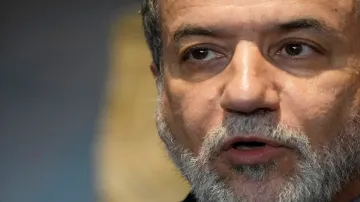Iran’s Foreign Minister on Friday (October 4) warned Israel that Tehran will “retaliate harshly” if it carries out an attack on Iran, in response to the latest missle salvo on the Jewish country on October 1. Iran had launched a massive ballistic missile attack on Israel to retaliate the killing of Hezbollah chief Hassan Nasrallah in an Israeli airstrike last month, further pushing the Middle East to the brink. Israeli Prime Minister Benjamin Netanyahu had said that Iran committed a big mistake and it will pay for its actions.
Iran had fired over 180 missiles at Israel, most of which were intercepted by the country’s air defence systems. The move, however, escalated the tensions in the Middle East which were already soaring due to the Israel-Hezbollah conflict.
“If the Israeli entity takes any step or measure against us, our retaliation will be stronger than the previous one,” Foreign Minister Abbas Araghchi said.
His remarks came after meeting Lebanon’s Parliament Speaker Nabih Berri in Beirut. The minister said that Iran’s attack on Israel was in “legitimate self defense” after its attacks on Iran and the Iranian consulate in Syria in April.
Iran Minister on Israel’s ceasefire with Hezbollah
Araghchi said that Iran backs any step taken towards a cease-fire between Israel and Hezbollah, however, added that this will only happen when a cease-fire in Gaza goes into effect.
He said Iran backs any cease-fire on the condition that it “preserves the right of the Lebanese people, that it be accepted by the resistance (Hezbollah) and coincides with a cease-fire in Gaza.”
Joe Biden reacts to speculations of war
US President Joe Biden said he did not believe there is going to be an "all-out war" in the Middle East as Israel is weighing options for a retaliatory attack after Iran's largest-ever missile attack on Tuesday.
While the United States, the European Union, and other allies have called for an immediate 21-day ceasefire in the Israel-Lebanon conflict, Biden said the US was discussing with Israel its options for responding to Tehran's assault, which included Israel striking Iran's oil facilities. We're discussing that. I think that would be a little... anyway," he said.
International community calls for restraint
The Group of Seven nations, which includes the US, Britain and allies, on Thursday condemned Iran's missile attack on Tuesday and reaffirmed their commitment to Israel's security. But the group also called for restraint, a ceasefire in Gaza and a halt to hostilities in Lebanon. "A dangerous cycle of attacks and retaliation risks fuelling an uncontrollable escalation in the Middle East, which is in no one's interest," it said.
(With AP inputs)
ALSO READ | 'Muslims have a common enemy': Iran's Khamenei vows to foil Israel's plans in rare Friday address
Latest World News
